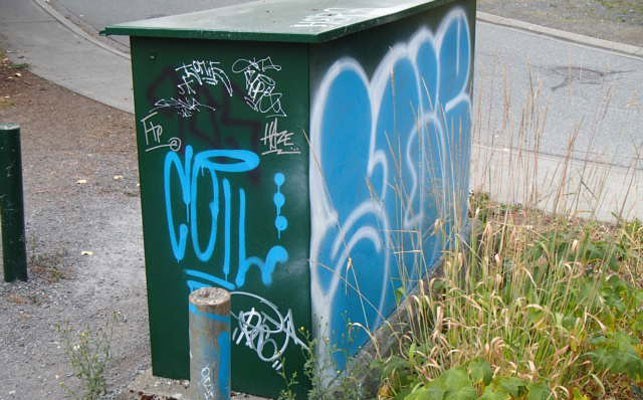For Perri Domm, it's simple: You wouldn't mow the lawn once a year and expect it to remain weed-free, so why would you take a similarly ad hoc approach towards graffiti?
It's a question the founder of Goodbye Graffiti has put to the Resort Municipality of Whistler (RMOW) recently in a series of strongly worded letters calling on officials to adopt a "zero-tolerance" policy towards vandalism.
For Domm, a Whistler resident, seeing the number of graffiti tags that have popped up in the community this summer has been especially troubling, given his line of work. He claims to have photographed more than 1,800 tags from the south end of town to Meadow Park one recent week, and even set up a website, www.whistlergraffitiproblem.com, to document his finds.
It is yet more proof to him that the municipality needs to change tacks on how it handles vandalism.
"I knew 20 years ago that Whistler had a growing problem with graffiti when I first talked to (the RMOW), and not much has changed," Domm said.
The municipality currently handles graffiti removal in-house, efforts that have ramped up this summer, Mayor Nancy Wilhelm-Morden said.
Officials are so far satisfied with the results.
"We've got the Village (Maintenance) staff diligent about identifying and removing graffiti regularly. We also, through our communications, try to prevent graffiti in the first place, and focus on prominent village and park locations as a priority," she explained.
Typically, RMOW staff will repaint vandalized kiosks in residential areas, for instance, and use special wraps to prevent graffiti on utility boxes — although Wilhelm-Morden acknowledged "they can be pretty expensive."
This speaks to the main benefit Domm sees in hiring the specialized services Goodbye Graffiti can offer: driving down the cost to taxpayers.
"Municipalities waste so much money, it drives me mad," he said.
"We're talking about really smart people with millions of dollars — way more money than a lot of municipalities. What is the problem? Why not just pay us a flat monthly fee and we'll clean the municipality from one end to the other?"
After the initial push to remove the bulk of the graffiti from the resort, Domm estimated his company's services would cost the RMOW around $3,000 a month. It's unclear how that compares to current costs at municipal hall, as Wilhelm-Morden said staff had not yet done a cost analysis, but that officials "may well do that as part of the next budgeting process."
Domm knows some will see his push as a way to drum up business for his company, a notion that was echoed by Whistler's mayor.
"This is a business opportunity for him, of course. It isn't volunteerism," Wilhelm-Morden said. "Good for him for identifying an opportunity, but at this point we're satisfied with dealing with (graffiti) internally."
But with close to 150 municipal contracts nationwide, including with the cities of Vancouver, Toronto and Montreal, Domm claims it's not about the money, but keeping the community he calls home in pristine condition.
The reality is, according to Domm, that his company, with two decades of experience and a range of specialized tools and products at its disposal, is simply the best, most cost-effective and sustainable choice for the job.
"This is the kind of programming that you'd think this town would just eat up," he said. "Am I not talking the right language? We're talking sustainability, we're talking about declining costs, we're talking about being proactive, we're talking about unlimited, on-call, fixed budget costs annually. No surprises. None. Ever."
When contacted, Whistler RCMP Cpl. Diane Blain seemed to vouch for a zero-tolerance policy, saying that "graffiti attracts graffiti, so it's always recommended to remove (tags) as soon as possible," but she acknowledged dealing with vandalism requires an all-hands-on-deck approach.
"I think it would have to be a community effort, to be honest with you," she noted. "The RMOW would be one of the partners in there. That's how I see it, and that's how I've seen it in places like Langley, where I've worked."




